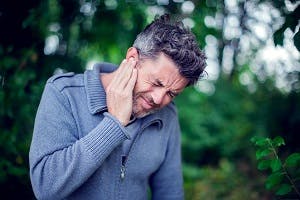If certain sounds make you cover your ears, you may have sound sensitivity caused by tinnitus, misophonia, or hyperacusis. Get the facts on these hearing conditions and how you can treat them.
What Is Tinnitus?
Tinnitus is a condition that causes ringing in your ears. It’s usually a symptom of other health problems like high blood pressure, ear injury, or a circulatory disorder.
Causes: Tinnitus is often caused by damage to your hair cells – transmitters in your ears that send electrical signals from your auditory nerve to your brain. Tinnitus is caused by age-related hearing loss, exposure to loud noises, and ototoxic medications.
Symptoms: Ringing, buzzing, or roaring in one or both ears that interferes with your ability to listen or interact.
Treatment: Prevent further hearing damage by reducing your exposure to loud noises or wearing earplugs. Ask your audiologist about hearing aids with masking programs to reduce the effects of tinnitus. Cognitive-behavioral therapy can help you learn techniques to regulate your emotional response as well.
What Is Misophonia?
Misophonia means hatred or fear of sound. It’s a neurological condition in which a person has a strong emotional or physical reaction to sounds like chewing or breathing.
Causes: Misophonia is a psychological condition often associated with obsessive-compulsive and anxiety disorders. The exact causes are unknown, but studies have shown misophonia usually develops between the ages of 9 and 12.
Symptoms:
- A feeling of dread or anxiety
- Increased heart rate
- Muscle tightness
- Sweating
- Strong emotional responses
- Short temper
Treatment: Like tinnitus, misophonia is treated with cognitive-behavioral therapy or counseling. These treatments focus on changing your negative associations with trigger sounds. Using white noise machines or other devices to mask these sounds can help you manage your reactions.
What Is Hyperacusis?
If sounds cause your ears physical pain, you may have hyperacusis. Sounds with a moderate volume can seem loud, intense, and annoying.
Causes: Hyperacusis may be the result of exposure to loud noises. The irreparable damage to the ear’s hair cells makes it difficult for your brain to process volume accurately. It’s also caused by health conditions and injuries like:
- Head, neck, or ear injury
- Ear infections
- Temporomandibular joint disorder
- Meniere’s disease
Symptoms:
- Heightened sensitivity to everyday sounds
- Physical discomfort in one or both ears
- Anxiety or uneasiness
- Increase heart rate
- Sweating
Treatment: Effective hyperacusis treatment depends on the cause. Treating an injury or infection may ease your symptoms. Behavioral therapy can help treat the anxiety associated with hyperacusis, and acoustic therapy can decrease your sensitivity to sounds.
Contact Hearing Associates online or call 888.760.2032 to speak with an audiologist about your hearing sensitivity today.


